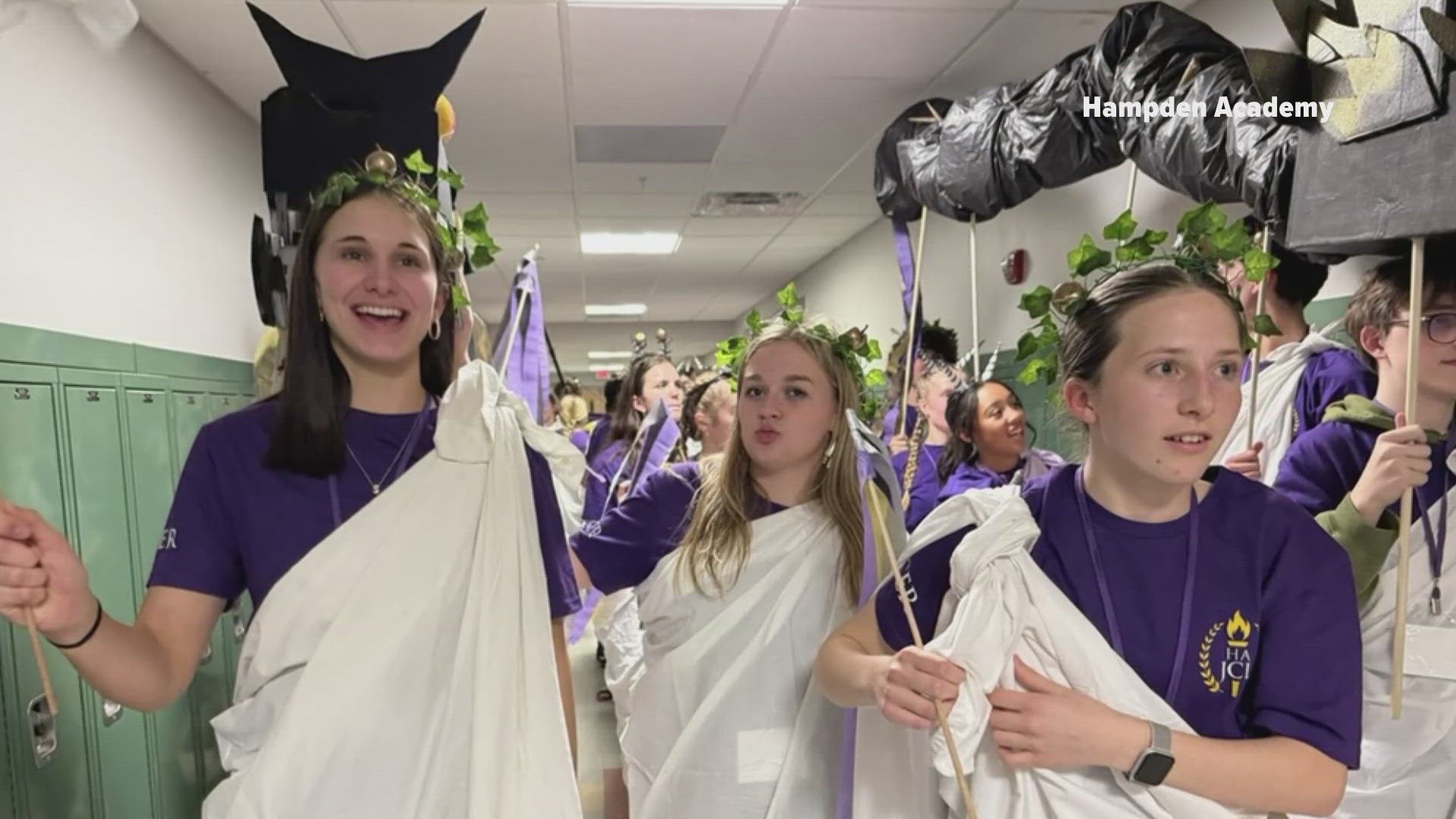WATERVILLE, Maine — It was a Friday night at Waterville High School, long after classes were dismissed. But all was not quiet in the building.
Busloads of students from 10 different Maine schools joined their Waterville peers in the auditorium—more than 200 in all—for a twice-a-year celebration of the Latin language and ancient mythology. It's called the Junior Classical League.
Rorie Littlefield, a Sacopee Valley High senior, was the club's first vice president.
"It's to show the appreciation and the uplifting of a dead language and to show the spirit of the gods," she allowed a smirk while speaking with me before the festivities. "...and, just, see what you guys know."
JCL is a club with chapters nationwide, specifically for students enrolled in Latin who want to take things to the next level. On this Nov. Friday night, Littlefield had helped organize Maine JCL's fall convention, with another one planned for the spring.
"Each year, they come in and they're just more excited than the last, and I just love it," Littlefield explained. "I love doing it for them."
This convention's theme was mythological monsters. Each school introduced themselves accordingly, acting and dressing like creatures of ancient lore.
Then, they split off into classrooms, where they competed in several events. Trophies would await the winners at the end of the night. In one room, students hastily marked and erased answers for a written Latin exam. Their pencils and a flip of a paper were the only sounds heard. The mood was tense, almost SAT-like, yet this was supposed to be fun.
In another room, students engaged in Certamen, a quiz-style game for Latin students. It was a decidedly more energetic atmosphere. And, downstairs in the school's library, a mob participated in the most chaotic game of charades I had ever witnessed. One of the club executives showed a few students the name of a mythological monster written on a piece of paper and then sent them back to their respective teams to act it out. Besides the silent actors, nearly every other student screamed answers, to the point where it was impossible to tell who.
"We're just guessing, honestly," admitted one of the executives picking the winners. "We're hoping for the best. If they scream loud enough, we give it to them."
As I studied the room, the surprising, and maybe fortunate, news I learned is, that the charades fiasco was purely for fun. Judging by the custom tee shirts, there were students from each school on each team. No points would be exchanged.
With such specific criteria for joining JCL, needing to take Latin as a foreign language and then joining the club during sports seasons, it is a tight group, admittedly a bit nerdy; and led by teachers who really care, like Meg Cook.
Cook recently retired from teaching Latin at Winthrop High School for 43 years. She was formerly state chair of JCL, and still attended conventions. Fittingly, Littlefield called her, "the god of JCL."
"Well, it's very touching," Cook said when I told her of Littlefield's title for her. "It means a lot to me that these kids even care who I am."
Each group of students eventually rotated through dinner in the cafeteria. That's where I met Gardiner student Connor Tibbetts and asked him why kids gravitated toward JCL.
"Well, the tests - not 100% sure why we do those," he laughed. "But, overall, I think people just have a lot of fun. You see a lot of people; get out; see some people. You do a lot of Latin and you get to showcase what you've been doing all year."
With teachers like Cook, the kids feel they can be anything. That freedom propels them to act like monsters on an auditorium stage. But when they go back to their own schools, some others just don't get it.
"My friends definitely think I'm a loser," Littlefield said. "But I ran with it and I'm the first vice president of the state. So, it's pretty exciting to come home and say, 'I get to do and go watch everyone have a great time, and I think it's really fun.' They support me, even though it's a little wild with all of the makeup and the costumes and screaming."
But, I told her, the word "loser" can carry a lot of weight.
"It can. It definitely was one of my friends who said I was a loser for it," Littlefield responded. "I think it's just the point of choosing to ignore it and, just, realizing that there's a lot of anxiety behind coming to something for the first time and not understanding what you are doing. But, after realizing that everyone here looks like a fool, and you're all fools in something together; I think, at the end of the day, it's just like, maybe at school you're not the coolest kid in it for being in a club for a language. But, definitely, when you can enjoy what you do and what you learn in class, I think it makes it worth it."
Some people, even friends, don't understand. Plus, it's a dead language and the mythology is just that - a myth. But spend time with this group and it's hard not to feel their enthusiasm.
"It's OK to be smart; it's OK to be a nerd here; everybody's accepted," Cook said. "And there's no judgement about if all you want to do is sit in your room and memorize mythology facts. That's OK. Somebody has to do it for a team to be successful. The kids are very forgiving to each other."
A teacher couldn't ask for more.

